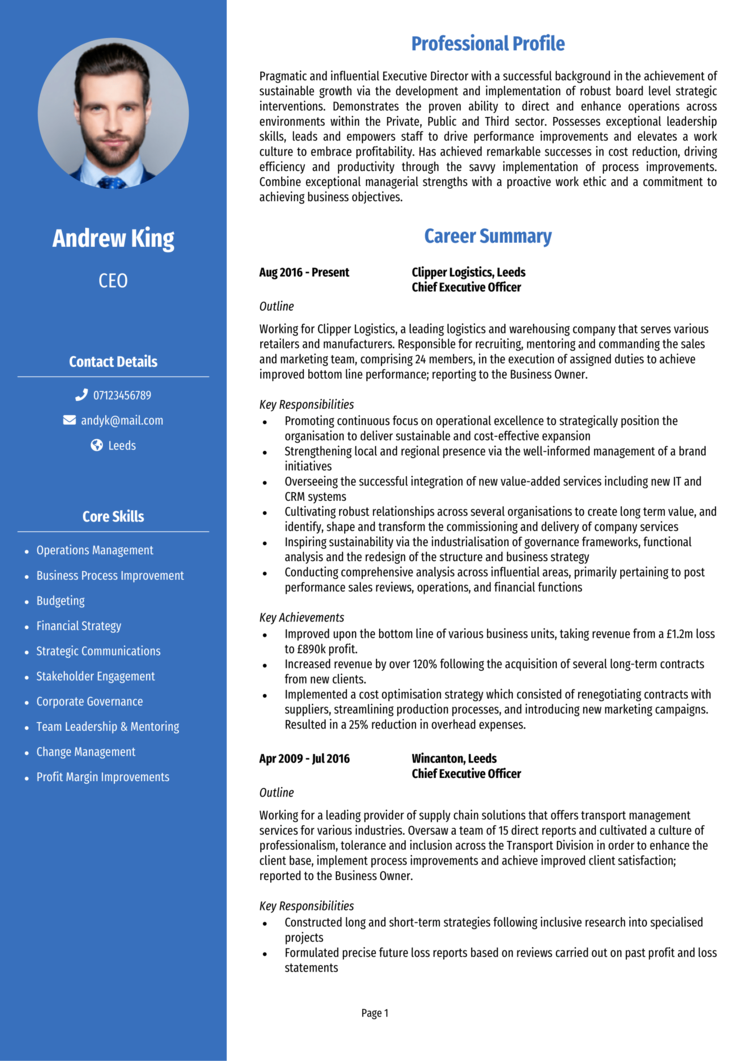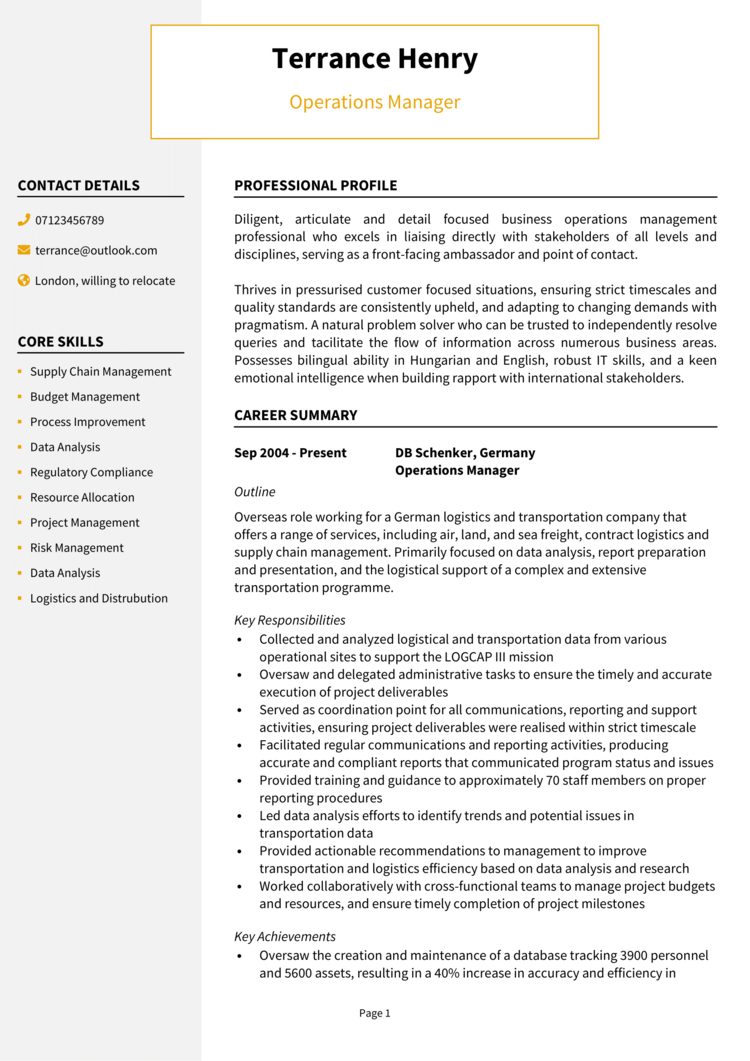Running a successful business takes leadership, strategy, and sharp decision-making – and as a Business Manager, you know how to juggle all three.
But before you can drive profits and streamline processes for your next employer, you need to convince them you’re the right person for the job. And that starts with your CV.
These Business Manager CV examples and this simple guide will walk you through crafting a Business Manager CV that highlights your leadership strengths and results-driven approach – helping you land interviews and earn the senior roles you deserve.
Business Manager CV example

Hotel Manager CV example

CEO CV example

Operations Manager CV

Business Owner CV example

How to write your Business Manager CV
Discover how to craft a Business Manager CV that lands interviews with this simple step-by-step guide.
Writing a CV as a Business Manager isn’t just a list of duties – it’s a strategic document that proves you know how to lead teams and keep operations running smoothly.
This guide breaks down exactly how to present your skills and experience, so hiring managers can see you’ve got the leadership know-how and commercial awareness to make a real impact.
How should you structure your Business Manager CV?


You wouldn’t manage a team without a plan, so don’t expect to land a role without a well-crafted CV. Your job is about efficiency, and your CV should reflect that with a clear structure.
This’ll reflect the same organisational skills you’ll bring to the business itself. Employers want to find the key details quickly – show them you know how to present information clearly and professionally.
Here’s the layout your CV should follow:
- Name and contact details – Start with your name and persona details – make it simple for recruiters to reach you. Including a photo is a personal choice.
- Profile – Introduce yourself with a summary of your leadership experience, commercial awareness, and operational skills.
- Core skills – Give a quick snapshot of essential abilities, such as process optimisation, team leadership, and budget management.
- Work experience – Lay out your management roles in reverse chronological order, focusing on results and strategic contributions.
- Education – Outline your education and certifications, focusing on those most relevant to the role.
- Additional info – Optionally, mention memberships, awards, or hobbies that add to your leadership profile.
The best way to format your Business Manager CV


If your CV is more cluttered than an overbooked calendar, it’s time to clean it up. Professionalism matters for leadership roles, and your CV needs to reflect that with a clear format, free from mistakes. If your CV is chaotic, employers may question your ability to bring order to their business.
Stick to these formatting tips:
- Bullet points – Employ short, punchy bullet points to make responsibilities and achievements easy to read.
- Divide sections – Separate each part of your CV logically so nothing important gets overlooked.
- Use a clear and readable font – Choose a professional, readable font that keeps the focus on your content.
- No more than 2 pages – Aim for two pages – plenty of length to show your expertise without overwhelming the reader.
Business Manager CV profile


Your profile sets the tone for your whole application. It’s your chance to quickly explain why you’re the Business Manager they need, so it should highlight your leadership style, commercial focus, and operational expertise, with the aim of conveying the benefits that hiring you would bring.
Business Manager CV profile examples
Profile 1
Strategic and results-oriented Business Manager with four years of experience overseeing operations, financial planning, and team leadership. Skilled in process optimisation, budget management, and business development. Proficient in CRM software, financial reporting, and market analysis. Committed to driving efficiency and profitability while ensuring a high-performing work environment.
Profile 2
Experienced Business Manager with three years of expertise in managing daily operations, coordinating cross-functional teams, and implementing growth strategies. Adept at analysing market trends, improving workflow efficiency, and enhancing customer engagement. Skilled in financial oversight and business strategy execution. Passionate about fostering team collaboration and business success.
Profile 3
Dynamic Business Manager with over six years of experience leading business operations, increasing revenue, and optimising resource allocation. Skilled in project management, stakeholder engagement, and strategic planning. Proficient in using ERP systems and data analytics to improve decision-making. Dedicated to ensuring business sustainability and long-term growth.
Details to put in your Business Manager CV profile
Here’s what to cover:
- Leadership experience – Mention your background managing teams and driving business success.
- Strategic thinking – Highlight your ability to develop and implement plans that achieve commercial goals.
- Operational excellence – Emphasise your strength in optimising processes, managing resources, and delivering improvements.
- Financial oversight – Touch on your experience managing budgets, costs, and financial targets.
- Business impact – Frame yourself as someone who doesn’t just manage processes – you improve them to deliver stronger results.
How to present your core skills section properly


A Business Manager wears many hats – this section should include the key skills that drive success. Hiring managers want to see your ability to lead, strategise, and optimise – put those skills front and centre.
Think of the skills for your CV as your KPIs – make sure they’re measurable and relevant. Every company will have different priorities, so tailor this list to the job you’re applying for. Focus on the skills most valued in that particular industry or business model.
Most important skills for a Business Manager CV
- Strategic Planning – Developing and executing business strategies to drive growth and achieve company objectives.
- Financial Management – Overseeing budgets, cost control, and financial forecasting to ensure profitability.
- Team Leadership and Development – Managing staff, fostering a positive work culture, and ensuring team productivity.
- Operational Efficiency – Streamlining business processes to improve workflow, reduce costs, and enhance performance.
- Sales and Business Development – Identifying new market opportunities, building client relationships, and driving revenue growth.
- Market Research and Competitor Analysis – Assessing industry trends, customer behaviour, and competitor strategies to inform decision-making.
- Stakeholder Engagement – Collaborating with executives, suppliers, and clients to align business goals and priorities.
- Risk Management and Compliance – Ensuring adherence to legal, financial, and operational regulations.
- Performance Monitoring and Reporting – Tracking key performance indicators (KPIs) and making data-driven improvements.
- Change Management and Innovation – Leading business transformation initiatives and implementing new technologies or processes.
Work experience


The real proof of your ability lies in your work experience. This section should demonstrate how you’ve applied your leadership skills to deliver measurable results – whether that’s increasing revenue, streamlining processes, or improving team performance.
List your roles in reverse chronological order, starting with your most recent job. Focus on the business challenges you tackled, the strategies you implemented, and the results you achieved. Even if a role didn’t have “Business” or “Manager” in the title, show how you took ownership of processes, teams, and projects.
Structuring your jobs

- Outline – Summarise the company’s size, industry, and your place within the management team.
- Responsibilities – Explain the key areas you managed, such as overseeing daily operations, managing budgets, or improving processes.
- Achievements – Showcase measurable results, such as revenue growth, cost reductions, operational efficiencies, or successful projects delivered under your leadership.
Example jobs for Business Managers
Business Manager | Ladders Corporate Solutions
Outline
For a leading UK business consultancy, managed daily operations, client relations, and financial planning to optimise business performance.
Responsibilities
- Developed and implemented business strategies to improve operational efficiency.
- Managed budgets and financial planning, ensuring profitability and cost control.
- Led a team of 15 employees, providing training and mentorship to enhance productivity.
- Analysed market trends and competitor performance to identify growth opportunities.
- Worked closely with senior management to align business goals with company objectives.
Achievements
- Increased annual revenue by 25 percent through process improvements and strategic planning.
- Reduced operational costs by 15 percent by streamlining workflows and supplier negotiations.
- Recognised for enhancing team performance and fostering a positive work culture.
Business Manager | Vertex Retail Group
Outline
For a national retail chain, oversaw store operations, financial performance, and customer engagement strategies to drive business success.
Responsibilities
- Supervised daily store operations, ensuring sales targets and customer service goals were met.
- Managed financial planning, including budgeting, forecasting, and expenditure control.
- Led staff training initiatives to improve sales techniques and customer service.
- Analysed sales data to develop promotional campaigns and optimise product placement.
- Maintained compliance with health and safety regulations and company policies.
Achievements
- Boosted store revenue by 30 percent through targeted marketing initiatives.
- Reduced staff turnover by 20 percent by implementing employee engagement programs.
- Achieved top-performing store status for three consecutive quarters.
Business Manager | Platinum Tech Solutions
Outline
Within the management team of a global technology firm, led business operations, project management, and strategic growth initiatives.
Responsibilities
- Directed cross-functional teams, ensuring project deadlines and business goals were met.
- Implemented data-driven decision-making to optimise business processes and resource allocation.
- Developed and maintained relationships with key stakeholders, clients, and vendors.
- Managed financial reporting and risk assessment to support long-term growth.
- Led digital transformation initiatives, improving productivity and system efficiency.
Achievements
- Increased company revenue by £5M through strategic business development efforts.
- Implemented an automation system that improved operational efficiency by 35 percent.
- Recognised for driving innovation and improving business resilience.
How to write your education section


While hands-on leadership experience is often most valuable, your education adds important context – especially if you hold qualifications in business management, leadership, or financial management.
List your degrees, diplomas, and any leadership training, including the institution and completion date. If you’ve completed executive development courses or certifications related to operational excellence, process improvement, or financial management, highlight these to strengthen your profile further.
If you’re transitioning into management from a different background, emphasise any leadership training or management courses that show you’re equipped for the step up.
Best qualifications for Business Managers
- BA/BSc in Business Management or Business Administration – A strong foundation for any management role.
- MBA (Master of Business Administration) – Particularly valuable for senior roles or corporate leadership.
- ILM Level 5 Certificate in Leadership & Management – A respected qualification for mid-level management.
- PRINCE2 Foundation/Practitioner – Beneficial for managers involved in project delivery and process improvement.
- CIMA Certificate in Business Accounting – Useful for managers who oversee budgets and financial performance.





